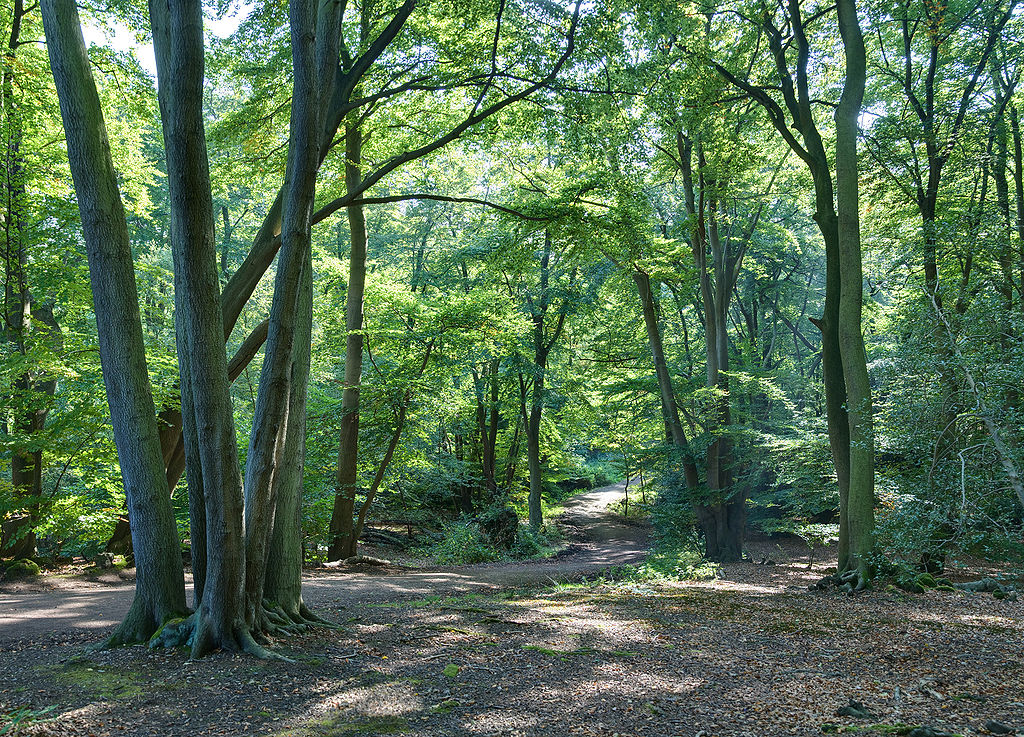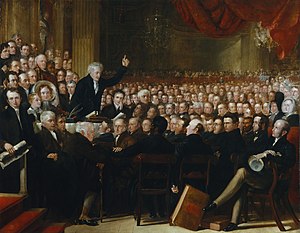The parish straddles Epping Forest ,
part but not all of it being in its boundaries.

By Diliff - Own work, CC BY-SA 3.0, https://commons.wikimedia.org/w/index.php?curid=4896990
In 1865 the Great Eastern Railway came to Theydon Bois, and this led to
some urban development in a basically rural setting, including the
building of working and middle class housing. As a result, the population increased steadily to 1,297 in 1901 and then
held stationary for twenty years. The movement to conserve Epping Forest
defeated plans to open the area up for development - as we shall see, the
family of Alice 's
employers played a role in this. The main function of this part of the Forest during the period was to provide a healthy and relaxing day out for the often impoverished inhabitants of London's East End. To this end, there were two 'Retreats' in or near the village; these provided refreshment and entertainment for day-trippers. Both were destroyed by enemy activity during WW11. A rather quiet village must have come alive at weekends!
The modern church, a red-brick Gothic Revival
erection, was built in 1850, although it contains some items from the original
medieval church. The second building, completed in 1844, wasn't a roaring success, as it was so unsound that
it had to be quickly knocked down and replaced by the building which Alice

Frances Mary Buss, the pioneer of female education is buried in the churchyard:

By Acabashi - Own work, CC BY-SA 4.0, https://commons.wikimedia.org/w/index.php?curid=47030896
There was no Catholic Church, but there was a Baptist
chapel, which in 1900 had 20 worshippers and taught 60 Sunday School children.
In 1902 national legislation meant that the Anglican-run village school came
under control of the Epping School Board. It stands next to St Mary the Virgin,
and in 1906 it had about 150 pupils. To accommodate this number a large
classroom was added in 1903.
In 1900 main drains were laid and the old
school knocked down and built on more secure foundations.Electricity didn't come to the village until 1928 and even today the villagers have voted to
keep the 'traditional' feel (and the low Council Tax bills) by eschewing street
lighting.

CC BY-SA 3.0, https://en.wikipedia.org/w/index.php?curid=4597691
And what of the man Alice came here to work for?
Gerald Buxton was born in 1862 to an important family. His
parents were Edward North Buxton (1840-1924) and Emily Digby. Edward North's
father was also named Edward North, the second Baronet, (1812-1858) and the
father of this Edward North was Thomas Fowell Buxton (1786-1845), the first
Baronet and a man of immense distinction.

Thomas Fowell Buxton's mother was a Quaker and Thomas
married the sister of the famous Quaker prison reformer Elizabeth Fry. His money came
from brewing - he eventually became sole
owner of a brewery called Truman, Hanbury, Buxton and Co. In 1818 he entered Parliament for a Dorset
constituency. Although he was a member of the Church of England, his connections
with the Quakers, who were heavily involved in social reform, led him to
campaign for improvements in the criminal law and in prison conditions and for the
abolition of slavery. The slave trade was indeed abolished in the British
Empire in 1807, but those slaves traded before that date remained
in servitude. In 1823 he founded what was to become the Anti-Slavery Society. In 1833 slavery was abolished in most of the British Empire .

World Anti-Slavery Convention, 1840: Buxton is third back on the extreme left. The speaker is Thomas Clarkson.
In 1840 he was made a Baronet, but his health was already
declining and he died five years later. He's on the five pound note that's
currently being phased out,the bespectacled man in the group listening to his sister-in-law Elizabeth Fry.
Thomas and Hannah had eight children; four of them died of
whooping cough in a five week period, and one died of TB later. One of the
survivors was Edward North Buxton, who became the second Baronet on his
father's death in 1845. He was also a member of parliament. He named his second
son after himself - born in 1840 Edmund North Buxton (the second') became a Liberal MP in 1885. He believed in
the public provision of open spaces, especially near cities. He and his older brother Thomas (the third Baronet)
played an important role in turning over parts of Epping and Hainault forests
to public use. Thomas went on to govern South
Australia between 1885 and 1889.
Gerald - his parents' first son - was born on October 30,
1862. He seems to have had a twin Geraldine, their first daughter. On
October 30, 1890 Gerald married Lucy Ethel Pease. Lucy was also from a prominent
family of Quaker reformers - Lucy herself would be awarded an OBE. Their first
child, Blanche Emily Buxton, was born on November 16, 1891, the second, yet
another Edward North Buxton on February 7, 1894, and the third Rebekah Mary on January 21, 1900. The grave of Gerald and
Lucy also contains Joseph Alfred Buxton, 1904-1913, a final child
who died young. It seems Gerald Buxton built
the red brick Birch Hall in 1892, although another source says he 'acquired'
it. He moved there in 1893. It was demolished at some point between 1955 and 1992 and eventually the current
grandiose building with that name was constructed on the same site. All four
children would probably have been at Birch Hall during Alice 's time as a housemaid there.
Gerald entered Trinity
College , Cambridge , and, in spite of an aversion to serious
training, he won a running blue. In 1884 he graduated, entering Truman, Hanbury
and Buxton's brewery in the autumn of that year, eventually becoming chairman
of the firm. Although he didn't follow his ancestors into parliament, he was a
senior member of the Liberal Party in the Epping area and served in various
local government, justice and administrative bodies from soon after graduating
to the time of his death. He was also
Lord of the Manor of Theydon.
How did he act in these positions and what kind of a man was
he?
As a magistrate he was 'a kindly generous-minded man, always
ready to temper justice with mercy', and it seems that in all his positions and
in private life too he 'followed the traditions of his illustrious family in
trying at all times to alleviate the lot of his fellow men'. He was, for example,
a founder and committed supporter of the Cottage Hospital at Epping. In November 1904 he built cottages to give work to the unemployed of the village.
His compassion for
others was matched by other virtues of character: the keynote to character
'absolute sincerity, and simplicity, in word, thought and deed'. These
quotations are from the eulogy at is memorial service, but nothing I have read
about him makes me think there is much exaggeration. The eulogist clearly hints
that he was rather self-willed and impatient when others put obstacles in the
way of his schemes. He was an enthusiastic hunter and shooter, although not a
great fisherman. Many of us now dislike such activities, but they hardly mark
him out from other 'gentlemen' of the time.
Like other members of his family he had a particular concern
for Epping Forest . In 1908 he succeeded his
uncle as one of the Verderers of Epping Forest. 'Verderer' is an ancient post:
in the modern period its occupants are tasked with defending the rights to use
common land and with conservation of the traditional landscape and wildlife.
When did Alice Alice was confirmed in Angmering (Sussex

Her parents weren't living there, so my guess is
she was working there at the time, maybe in her first position. She was definitely
at Birch Hall in November 1905, and probably some time before that.
The birth certificate of her first child, Arthur James Stephenson,
states that her position in July 1906 states that she was a 'housemaid
domestic' at Birch Hall. Arthur was born there in the summer of 1906.
I don't know anything about the domestic life of Birch Hall but I do know a little about its public life in 1905-1906, In June, 1905
the Buxtons hosted a meeting of Epping Liberals, who enjoyed a talk on 'Free
Trade' followed by tea in Birch Hall's grounds. August 9 saw the Theydon Bois
Horticultural Society's annual Flower Show. Buxton was the Society's president,
but perhaps more telling is an associated event - the Donkey Show. He'd started
this in 1899 with the idea of securing better treatment for the Epping Forest donkeys. There were displays and prizes for
the best-cared animals: as well as the prizes, 37 donkeys won 'premium's of
five shillings, and Buxton claimed that this showed the event was proving
successful in improving standards. The
show continues to this day.
On October 31 the King was driven through Theydon Bois on a
tour of the Epping Forest area. Viscount Horncastle, the chairman of the
Epping Forest Committee, the Superintendent and a number of keepers assembled
outside Birch Hall. Edward stopped for a moment to exchange a few words. The
children of the village school lined up along the side of the road, 'under the
shadow of the church and the school', while the 10.50 'up' train was delayed to
make sure the Royal party didn't have to wait at the level crossing!
In 1906 the guest speaker claimed that the shows were 'a great occasion for the distinct' and the donkeys were even better cared for: 46 out of 50
received premiums. But sadly Josiah Street, who'd won a prize in 1899, was cautioned for ill-treatment some time during the year.
Gerald Buxton died on March 2,1928 after a lengthy period
of illness. He was buried at the church
of St Mary
One of Alice's daughters told me that Alice had liked her work as a servant. This kind of life would not appeal to many people today: the hours were long, and much of the work of getting the house back into shape had to be done before their employers had risen. In some households the maids were expected to flatten themselves face to the wall if one of the family entered the room while they were at work. But to Alice the abundant food in the servants' hall was more important: the grandson writing this blog was lucky enough to grow up in a world in which getting enough to meet was never a problem, so it really struck me when someone told me, 'Your grandmother was a proud woman - even before the war, if she had a guest, there'd always be fruit in the bowl'. It's easy to forget that ordinary families could not always be certain of getting enough to eat in the very different Britain before WW11.
The other thing that she liked about her work was the attitude of her employers. From all I've found about Gerald Buxton, I can see why. And, as for Lucy Ethel Buxton, O.B.E. (neé Pease), who died in 1948, and with whom Alice probably had more to do than with Gerald - well, research continues!

No comments:
Post a Comment